Table of Contents 🕹️
Introduction
Index Coop’s Metaverse Index
MVI Index Constituents
Ready Player One
I. Introduction 👾
Nowadays, people don't believe in these kinds of things. Except in the Metaverse, that is, where magic is possible.
-Neal Stephenson, Snow Crash
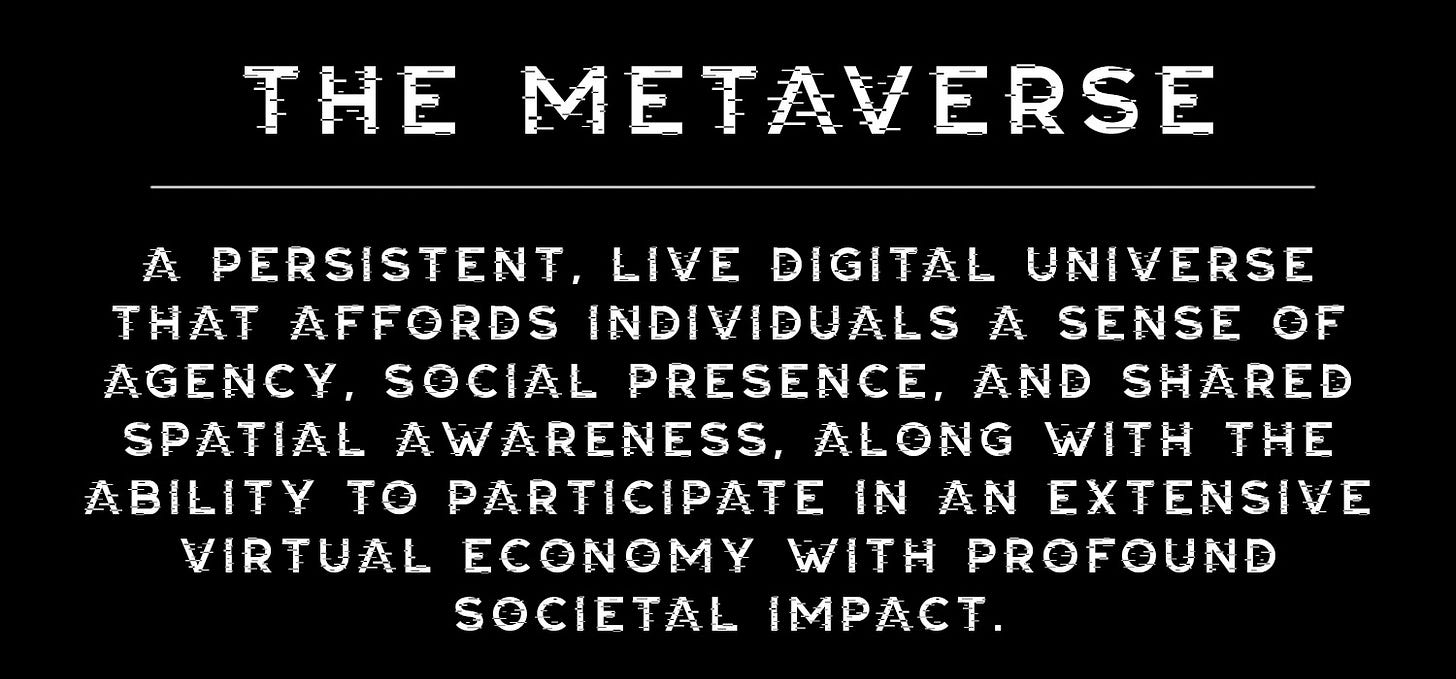
The Metaverse is coming.
It is a persistent, synchronous experience that spans the digital and physical worlds. It is highly interoperable and fueled by a creator-centric economy.
It is is not a video game, but video games are the humble origins of this much larger transformation of society and culture.
In 2023, the number of video game players worldwide will surpass 3 billion.
In the U.S., one out of every two kids plays Roblox.
The spatial Web is forming, built on the blockchain and viewed through VR. It is trust-minimized, efficient at value transfer, and gives ownership back to the user.
To familiarize yourself with the opportunity set, read Piers Kick’s Into The Void: Where Crypto Meets The Metaverse and Matthew Ball’s The Metaverse: What It Is, Where to Find it, Who Will Build It, and Fortnite.
To familiarize yourself with the experience, play Roblox, visit an NFT art museum in Decentraland, attend a VR social event.
For a savvy crypto investor that is seeking exposure to the space as a whole, a new opportunity has arrived: the Metaverse Index from Index Coop.
II. Index Coop’s Metaverse Index 👾
On April 7th, Index Coop launched the Metaverse Index ($MVI). According to the proposal, $MVI is “designed to capture the potential upside of the new but growing group of projects on Ethereum that relate to virtual ownership through NFTs, gaming, virtual reality and entertainment.”
$MVI uses the following criteria for inclusion in the index:
The token must be on Ethereum.
The protocol must be in one of the following Coingecko categories: Non Fungible Tokens, Entertainment, Virtual Reality, Augmented Reality, and Music.
The total market cap must be greater than $30m.
The protocol and associated token must have at least 3 months of history.
The token must have reasonable decentralized exchange liquidity.
The protocol should have completed an independent audit.
This is a market cap weighted index, meaning the constituents will consist of the largest names in the Metaverse space. The allocation is determined using a combination of root market cap and liquidity weighting adjustments, with rebalancing performed monthly and a 0.95% streaming fee. Notably, the streaming fee accrues directly to the Index Coop treasury.
It’s the $SPY of the Metaverse.
III. MVI Constituents 👾
Let’s review the holdings.
Enjin ($ENJ)
We believe virtual worlds of tomorrow will evolve into an interconnected digital reality. More than simulations, these new realms will empower us to create real-world value while having fun.
-Enjin
Enjin is an ecosystem of products that make it easy for game industry businesses to develop, trade, monetize, and market with blockchain technology. With over 20 million users and a robust product suite, Enjin can provide a competitive edge to businesses seeking to utilize tokenized digital assets as part of their acquisition, retention, engagement, and monetization strategies.
The entire Enjin ecosystem is powered by Enjin Coin ($ENJ). Through a minting process, $ENJ is transformed into gaming NFTs. This process can be reversed, melting the NFT back into $ENJ. The $ENJ within the NFTs creates a floor price, correlating the value of the NFT with the underlying $ENJ backing.
The potential of the Enjin Platform-as-a-Service model is exemplified by The Multiverse project. The Enjin Multiverse was the first blockchain gaming multiverse, founded in late 2018 after six games decided to collaborate on and implement a set of shared blockchain assets (9Lives Arena, Age of Rust, Bitcoin Hodler, CryptoFights, Forest Knight, and War of Crypta). It has since grown to more than 30 games.

Decentraland ($MANA)
The first fully decentralized world, Decentraland is a virtual reality platform where users can create and monetize content and experiences. Users purchase virtual land on-chain, giving them full creative control over what content is published on their parcel. The entire world is controlled via DAO, which owns the platform's smart contracts.
People are spending increasingly more time in virtual worlds, for both leisure and work. This occurs predominantly in 2D interfaces such as the web and mobile phones. But a traversable 3D world adds an immersive component as well as adjacency to other content, enabling physical clusters of communities.
-Decentraland
A visit to Decentraland is ripe with unique experiences. From visiting museums dedicated to NFT artworks, to gambling away your $MANA in virtual casinos, to attending live concerts from the likes of 3LAU & RAC, Decentraland is a vision of the future where decentralized platforms couple with Web3 technologies to create unique social experiences in a 3-dimensional space. If you haven’t checked out Decentraland before, click on any of those links, connect your Web3 wallet (e.g. Metamask), create an avatar, and begin exploring directly within your browser.
Two cryptoassets underlie the Decentraland economy: LAND, the nonfungible parcels in which the world is divided, and $MANA, an ERC20 token that is used to make in-game purchases of goods and services.
Real world businesses like Kraken and Atari have built headquarters in Decentraland. It is our belief that the low overhead coupled with 24/7 presence means more businesses will likely build storefronts in these types of virtual spaces.
The Sandbox ($SAND)
Familiar to fans of Minecraft and Roblox, the Sandbox is a community-driven platform where anyone can create and monetize gaming experiences on the blockchain using voxel NFT assets. The Sandbox ecosystem consists of three main products:
Voxel Editor - A simple 3D voxel modelling tool that allows anyone to create and animate 3D objects called ASSETS.
Marketplace - A web-based marketplace where users can buy and sell their ASSETS as ERC721 and ERC1155 tokens.
Game Maker - A game mode that allows anyone who hold ASSETS to place and use them on their LAND (an ERC721 token representing digital land in the Sandbox game). Users can decorate their LAND or create gameplay mechanics by scripting their ASSETS.
$SAND is an integral part of this vibrant Sandbox economy. $SAND is used to play games, purchase ASSETS and LAND, and customize player avatars. $SAND is also required to upload ASSETS to the marketplace. In addition, holders of $SAND can participate in governance over the platform using the DAO structure or stake their $SAND to earn passive revenues from a 5% fee capture model on marketplace transactions.
Our vision is to offer a deeply immersive metaverse in which players will create virtual worlds and games collaboratively and without central authority. We are aiming to disrupt the existing game makers like Minecraft and Roblox by providing creators true ownership of their creations as non-fungible tokens (NFTs) and rewarding their participation with our utility token – SAND.
-Sandbox
RedFOX Labs ($RFOX)
RedFOX Labs is an emerging technology venture incubator based in Southeast Asia. Incorporated as a joint-stock company in Vietnam, their goal is to build, launch, and scale high-growth ventures in e-commerce, e-media (i.e. e-sports/gaming), e-travel, and ride-sharing/logistics within the Southeast Asia region. The $RFOX token is used throughout the ecosystem as a form of payment.
New ventures are integrated into the RedFOX product suite and benefit from its platform economics. For example, RFOX Games is a set of interoperable, tournament-based video games using KOGs (another RedFOX product), which are collectible non-fungible tokens used in-game to unlock tournaments, skins, and VIP access to special events.
One of the more interesting announcements from RedFOX Labs is Virtual Space. The Virtual Space intends to be a fully-immersive shopping and retail experience that combines gaming elements with VR/AR technology. This Virtual Space will merge the digital and physical into a single shopping experience.
All shops, assets and billboards are NFTs and create unique opportunities for people to earn, interact and create. The roadmap will include physical items through individual store sales which will allow us to roll out local-level Virtual Spaces in Indonesia, Vietnam, Philippines, etc, revolutionizing a fully integrated shopping experience.
-Virtual Space Litepaper, RedFOX Labs
Axie Infinity ($AXS)
Axie Infinity is a major participant in the play-to-earn gaming revolution. Players battle and breed collectible NFT pets called Axies. As of the end of 2020, Axie Infinity is ranked the #1 Ethereum game by daily, weekly, and monthly active users even though it is still only in early-access, with expansive land gameplay scheduled to release later this year.
But Axie Infinity is more than a game. It has created a vast social network and jobs platform due to the robust community and play-to-earn opportunities available. An example of the latter: By Aug. 2020, the Phillipine government had provided a total of $267 in Covid relief compared to $300 to $400 a month players earned from playing Axie Infinity.
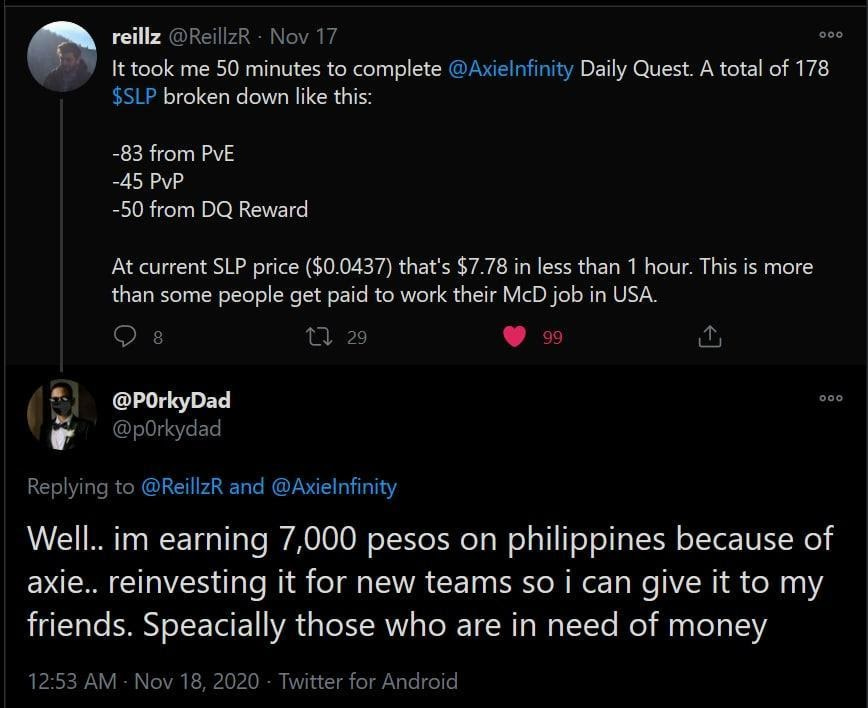
The $AXS token was developed in conjunction with Delphi Digital to align incentives between players and developers in a novel way. Players earn AXS by playing the game, staking, and participating in governance over the community treasury.
WHALE ($WHALE)
$WHALE is a social currency backed by rare NFTs. The basket of NFTs underpinning the currency are held in the $WHALE Vault, and include some of the rarest digital assets from Gods Unchained, Cryptovoxels, Sandbox, Avastars, and a variety of digital artists.
However, $WHALE intends to be more than just a vault of NFTs. As a social token, holders gain access to exclusive membership channels, games, NFT drops, networking opportunities, and a direct line of communication with WhaleShark_Pro, the anonymous collector behind the movement. Here are some of the opportunities $WHALE holders can unlock according to their whitepaper:
Purchase NFTs created by the $WHALE Community.
Purchase physical and digital $WHALE Swag.
Rental of NFTs from the $WHALE Vault.
Purchase of selected NFTs from the $WHALE Vault.
Participate in the $WHALE DAO for voting and decision making.
Participate in $WHALE liquidity Mining to receive monthly liquidity mining rewards.
Participate in Hold-2-Play roles such as Dolphin, Shark and Whale.
Attend virtual and physical $WHALE organized conferences
All revenues derived from the $WHALE project are reinvested back into the community, creating a virtuous cycle of appreciation through curation and expansion of the underlying assets.
Rarible ($RARI)
Rarible is a creator-centric NFT marketplace where anyone can mint, buy, and sell unique digital goods like artworks, game items, collectibles, and more. It is the only NFT marketplace to launch a governance token ($RARI), allowing the community to directly participate in governance over the marketplace and its treasury.
When considering the NFT stack, marketplaces like Rarible present a obvious market opportunity. For an investor, finding a high value NFT early on is highly speculative. However, if it were possible to invest directly in the NFT exchanges, it wouldn’t be necessary to pinpoint specific NFTs, instead benefiting from all NFT transaction volume on the exchange. $RARI is currently the only major NFT marketplace to have decentralized its governance and allowed investors to own a piece of the platform.
Meme Protocol ($MEME) 🍍
This tweet from Jordan Lyall was intended to mock the degenerate side of DeFi during the feverish DeFi Summer of 2020. The parody UI in the picture depicts a platform called The Degenerator, which would allow you to choose from a selection of existing smart contract code to essentially copy-paste a new DeFi platform. The associated Telegram of the satirical Degenerator ended up filling with community support, but after the community learned The Degenerator was just a joke, attention turned to launching their own token. Within a day of the original tweet, the meme coin $MEME was created, airdropped to Telegram participants, and grew to $1mm in daily trading volume.
Since its memetic origin, $MEME has grown into a decentralized protocol for farming NFTs. Combining the infamous DeFi yield farming with an art experiment, holders of $MEME stake their tokens in a pool, generating ‘pineapple points’ which can be used to purchase limited edition NFTs from artists and other collaborators.
The recent BadgerDAO pool emphasizes how this project blends DeFi and collectible NFTs. $bDIGG tokens from BadgerDAO can be staked on Meme to mint exclusive and official, limited edition Badger NFTs.
$MEME has grown from the Doge of DeFi to the future of France.
Audius ($AUDIO)
In 2017, the music industry generated $43 billion in revenue but only 12% of that went to artists.
Audius intends to solve this by creating a new model for music streaming using Web3 technologies. Audius is a fully decentralized music streaming protocol that allows artists to distribute to and get paid directly from their fans. The $AUDIO token is integrated throughout the platform, providing security, feature access, and governance administration. Most importantly, the $AUDIO token brings artists, fans, and node operators together in an incentive-aligned way to produce a streaming experience that combines engagement with the removal of intermediaries.
The project foresees artists creating and distributing their own tokens that will act as tickets to exclusive content. Audius attempts to simplify the issuance of these social tokens by providing a venue for distribution that is backed by the native $AUDIO currency. Audius could serve as an aggregator for other issuance platforms, such as Roll, Zora, and Rally, handling the distribution mechanism for those artist-created tokens while providing a music streaming platform.
Muse ($MUSE)
$MUSE is the governance token of NFT20, a protocol that seeks to tokenize NFT assets, making them tradable on decentralized exchanges (e.g. Uniswap or Sushiswap). Anyone with an NFT is able to create a pool on the protocol and receive an ERC20 token derivative of that NFT. This creates liquid secondary markets for what are typically more illiquid assets.
Here are some examples using Crypto Kitties pulled from their litepaper:
Example1: Linda owns 1 NFT Crypto Kitty that she can’t sell, she goes to the Crypto Kitty NFT20 asset page and deposits the Crypto Kitty NFT and gets 100 $KITTY tokens. She can now go to Uniswap and trade them right away, or use them to provide liquidity on Uniswap for fees.
Example2: Katherine owns a Gen 0 Crypto Kitty NFT that she thinks is worth more then 100 $KITTY tokens, so she creates a dutch auction for the market to decide a fair price in $KITTY tokens. She can cancel the auction at any time if the NFT is not sold.
Example3: Enea owns a Gen 0 Crypto Kitty NFT and on the NFT20 Crypto Kitty pool he sees a Gen 1 Kitty he likes. He tokenizes his Gen 0 Crypto Kitty for 100 $KITTY tokens and redeems them right away for the Gen 1 Kitty he wanted.
The $MUSE token’s main utility is to govern the NFT20 platform. Holders of $MUSE receive a portion of the 5% transaction fee collected by NFT20 and is paid out in the ERC20 token derivatives used in the transaction. This means a portion of every Doki Doki, Hashmasks, Wrapped Moon Cats, or whatever ERC20 derivative tokens that are transacted on the NFT20 DEX are partially distributed to holders. In other words, holding $MUSE is a way to get broad exposure to the NFT industry through fees collected from the various NFT20 projects.
Decentral Games ($DG)
Decentral Games is a DAO-governed Metaverse casino in Decentraland that players own and operate using the ERC20 governance token, $DG. Community members earn $DG by providing value to the ecosystem, such as playing games, providing liquidity, participating in governance, and referring new players.
Currently, players can select from a handful of games, including Blackjack, Roulette, Slots, and Backgammon, with Poker set to release in the near future, across three existing casinos: Chateau Satoshi, Tominoya, and Serenity Island.
The $DG token allows holders to vote on the management of a treasury (currently around $8mm), funding both new game development and ecosystem growth.
Exciting things are happening at Decentral Games. They are the first employer of 20 part-time humans to staff their virtual casino, providing real-life employment opportunities in the Metaverse. They have also partnered with Atari to build an Atari-themed casino in Decentraland.
Terra Virtua Kolect ($TVK)
Terra Virtua is an immersive platform that allows collectors to purchase digital collectibles and display them in a virtual reality space called the Fancave. Terra Virtua uses a gamified approach to engage its users in new and interesting ways, turning the collectible experience into a virtual gaming experience.
The Fancave acts as a digital storage for your collection. Users are able to customize their spaces and interact with their collectibles as real in-game items.
Imagine owning a rare car which you can showcase or even race on a virtual track against other players. Maybe you could own a unique spaceship to exhibit or explore in VR space? Or perhaps you want to show off your digital collection of vinyl album covers which can also unlock music – all in your personal lounge. It’s all possible in Terra Virtua. Your experience begins with owning your unique digital assets which you and your friends can share, trade, exhibit, play and enjoy.
Terra Virtua has worked on building strategic partnerships to expand their platform. For example, a licensing agreement with Legendary Entertainment was announced in February 2021 to issue a collection of digital assets to coincide with the release of the Godzilla vs. Kong movie. Terra Virtua has agreements in place with other entertainment powerhouses including Paramount Pictures and Legendary.
The $TVK token is used to join the Prestige Club, earn NFT airdrops, collect rewards, and access extra platform features. In addition, it acts as a currency to create your own digital collectibles using Terra Virtua’s tools.
NFTX ($NFTX)
NFTX is a platform for creating ERC20 tokens backed by NFT collectibles. Users are able to create and trade NFT-backed funds (e.g. CryptoPunks, Axies, CryptoKitties, and Avastars) right from a DEX like Sushiswap or Uniswap. This creates instant liquidity for NFTs, which are typically highly illiquid and difficult to price.
Digital land, in-game items, lease-agreements, digital art, digital collectibles, digital lottery tickets and more can all be represented as NFTs. As the NFT ecosystem grows it will get increasingly difficult to keep track of, and tokenized funds will become a necessity for many investors and trading platforms.
-NFTX
$NFTX is the governance token of the platform. Holders of $NFTX are able to vote on new proposals and govern the community treasury. While their isn’t currently a fee capture model for $NFTX, it is not inconceivable that fees are turned on in the future.
Worldwide Asset eXchange ($WAXE)
WAX is both a blockchain that is purpose-built for e-commerce transactions along with a protocol token that can be staked for governance voting and rewards. $WAXE is the Ethereum version of the protocol’s WAX token.
WAX is partnering with high-quality brands, such as Atari and Capcom, to sell NFTs on their platform. They are also trying to integrate their service into existing websites. They provide this example in a recent blog post:
An example site for placing such a widget would be on Twitch.tv, which broadcasts live streams from video game players. If a gamer was watching their favorite streamer playing in a match with an interesting skin, the gamer would click on the WAX widget displayed on Twitch.tv to purchase that skin from the streamer. The streamer would make additional revenue from selling their skins, Twitch.tv would get a cut of the transaction fee for hosting the widget, and the gamer would be able to purchase their skin without ever having to interrupt their viewing experience of the match.
REVV ($REVV)
$REVV is an ERC20 token that is used for purchase, utility, and action in supported play-to-earn motorsport blockchain games developed by Animoca Brands. These games currently include F1 Delta Time (the official Formula 1 blockchain game), MotoGP (an motorcycle racing game based on MotoGP), and Formula E (an officially licensed game with Formula E). $REVV has cross-title utility, being the main currency in-game to purchase gaming NFTs, pay entry fees for races, and earn rewards from winning.
IV. Ready Player One 👾
Virtual reality casinos and shopping centers. Play-to-earn gaming that can generate wages above a doctor’s in some countries. Social tokens backed by rare NFTs that unlock access to vibrant communities. Disruptive platforms seeking to overthrow traditional models.
The $MVI offers an easy, investable solution to gain exposure to the cutting edge of the Metaverse and Web3 technologies.
Are you ready to play, Anon? 🎮







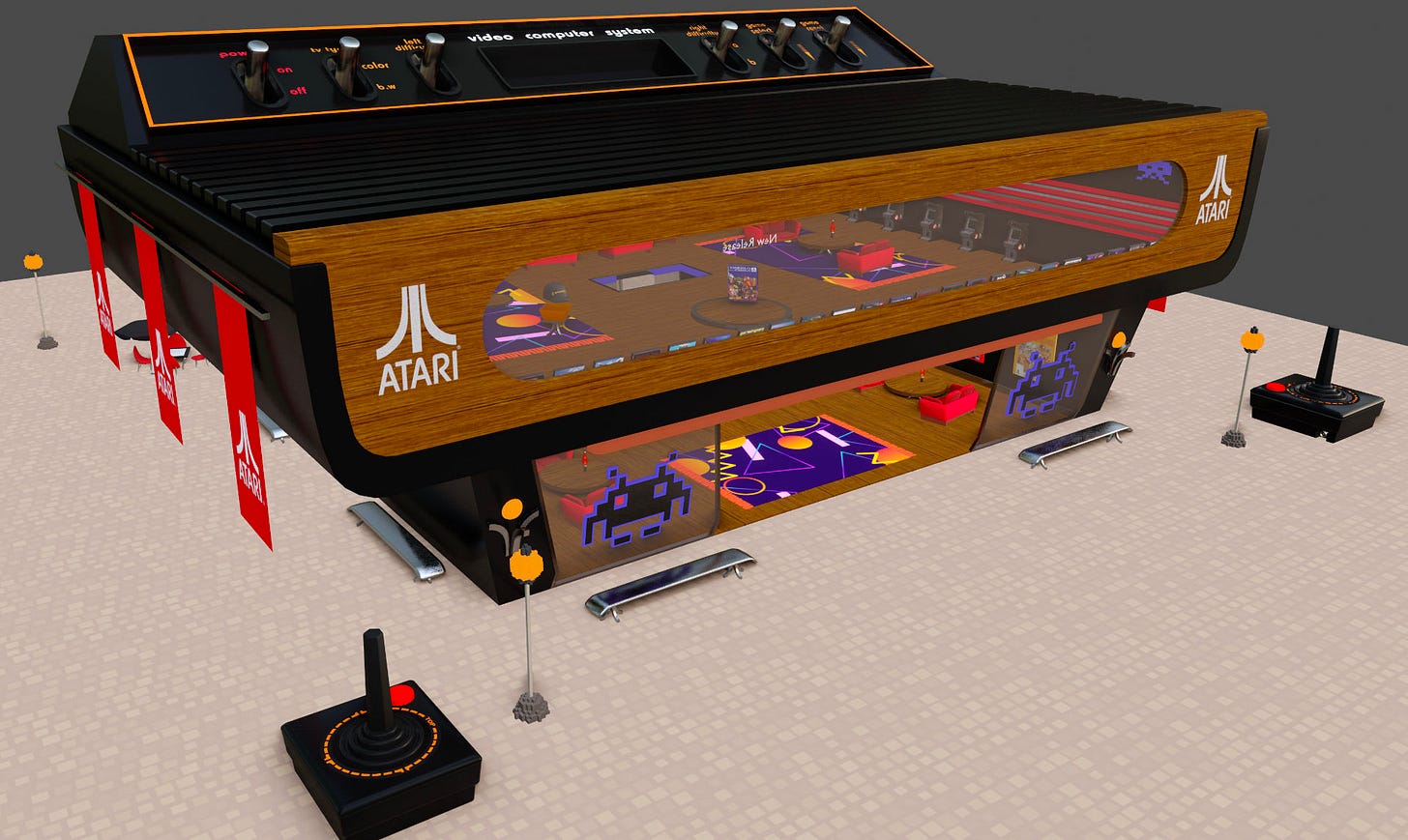











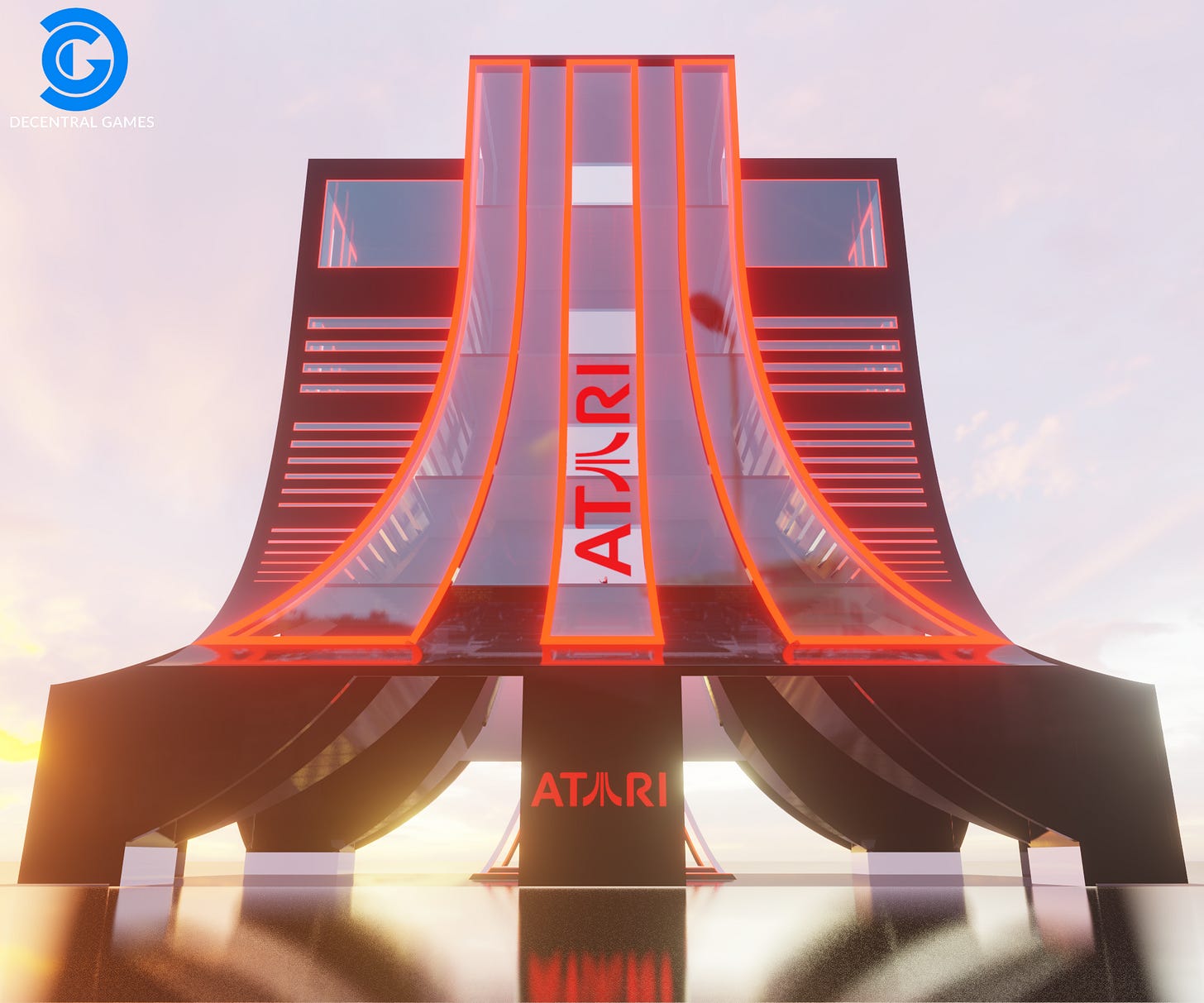

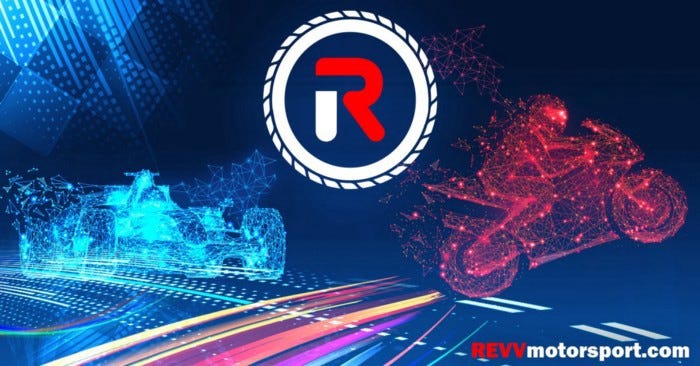
I wish I would have followed you in April. Love the concept and think this is a great long term play